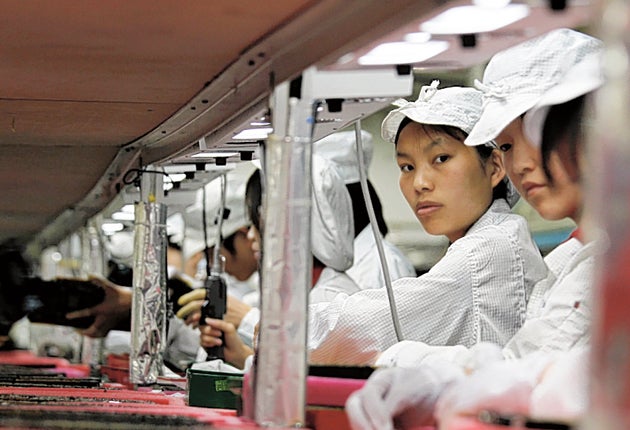The factory with nets to catch would-be suicides

Ma Zishan wept for his child in funereal white yesterday, with the Chinese symbol for "injustice" emblazoned on his back and carrying a portrait of his dead son Ma Xiangqian that bore the words: "give me the truth".
The elderly man was stationed outside the Foxconn complex in Shenzhen, southern China, and as he wept, his wife and daughter knelt alongside him. But Foxconn did not want to get to the bottom of Ma Xiangqian's apparent suicide yesterday. Nearby, officials handed out media passes for a tour of the company's sprawling electronics facility, where 300,000 employees work making the iPhone and iPad, plus products for Nokia, Sony, HP and Dell. It was part of a scramble to restore public faith in their embattled firm after a series of 11 suicide attempts, nine successful.
And so, instead of being confronted with a bereaved family, earlier in the day around 200 members of the media had thronged outside the Foxconn plant in the southern boom town to await their tour, their cars blocking the nearby roads. The chief executive of Foxconn's parent company Hon Hai, Terry Guo, had to press on as he tried to calm a critical media that has blasted his company's standing in recent days.
Mr Gou wasted no effort in showing the plant. He brought the reporters to see the factory, the workshop, dormitory facilities, staff care centre, and even the swimming pool. He repeatedly apologised. He said he had trouble sleeping at night because of the suicide. And he joked. "Reporting is a hard job," he told the journalists. "The press industry is a sweatshop business!"
In a workshop, he asked several female workers: "Do you know me?"
They responded in the affirmative.
"Is working here good?"
"It's good," they said.
In separate interviews with the Xinhua news agency, several female workers from Hunan and Hubei provinces said their working hours are 7.30am to 7.30pm and their monthly salary is 900 yuan (£91.46), plus overtime. An assembly line worker earns between £152.44 and £182.92 a month.
One young worker described the conditions. "Working at Foxconn is pretty busy. Chats are rare," she said.
"It was tiring working there. We often worked into the night and took over 100 extra shifts each month," said another employee surnamed Zhang, who quit after two years because of the workload.
But Taiwanese photographer Han Siu Keung, one of the journalists to tour the vast plant, told The Independent that it was apparently liked by the employees. "The factory is actually super-clean. Not like a sweatshop, not at all. And the workers seemed to like it there, and said the company treats them well," he said. Reporters who spoke to workers were watched by Foxconn staff members as they did so.
The company is building a 1.5 million sq m "safety net" to stop people jumping from the factory dormitories and workshops. (The staff live in shared dormitory complexes with divisions between men and women.)
"Although this is a stupid measure, at least in the future if another tragedy happens, it may save a life," Mr Guo said.
Around 70 professional psychologists have been stationed in Foxconn to carry out professional counselling, and help treat those with issues.
One of the suicides, a man surnamed Liang from eastern China's Anhui province, cut himself several times with a knife before leaping off. His seven room-mates said he was on a different shift to them, and there was little communication between them.
The management has said the number of suicides is because there is an "immature mentality" among those born between 1980 and 1999 – a generation that many Chinese think is spoiled. All the nine dead in the Foxconn suicides were between 18 and 24.
But others spoke of marginalisation in a company that has grown too quickly. "Too big, too tiring and too lonely," said a Mr Wang, who worked there less than a month. "Foxconn is too big. When I was walking to and from work in streets, I felt helplessly lonely," he said.
Join our commenting forum
Join thought-provoking conversations, follow other Independent readers and see their replies
0Comments